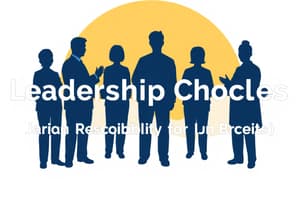Podcast
Questions and Answers
Match the following good choices with their examples:
Match the following good choices with their examples:
Personal Health = Choosing to exercise regularly and eat balanced meals Education = Pursuing further education or training to enhance skills Financial = Saving money and investing wisely for the future Relationships = Building supportive and positive relationships with family and friends
Match the following not good choices with their examples:
Match the following not good choices with their examples:
Health Risks = Smoking, excessive drinking, or neglecting mental health Financial Decisions = Overspending on unnecessary items or accumulating debt Education = Dropping out of school or avoiding learning opportunities Relationships = Engaging in toxic relationships or isolating oneself
Match the decision-making tips with their descriptions:
Match the decision-making tips with their descriptions:
Reflect = Take time to consider the potential impact of choices Evaluate Options = List pros and cons for each decision Seek Guidance = Consult with friends, family, or professionals for perspectives Learn from Experience = Analyze past decisions to inform future choices
Match the characteristics of good choices with their aspects:
Match the characteristics of good choices with their aspects:
Match the characteristics of not good choices with their aspects:
Match the characteristics of not good choices with their aspects:
Match the personal benefits of good choices with their outcomes:
Match the personal benefits of good choices with their outcomes:
Match the negative impacts of not good choices with their consequences:
Match the negative impacts of not good choices with their consequences:
Match the examples of good choices with their categories:
Match the examples of good choices with their categories:
Match the examples of not good choices with their categories:
Match the examples of not good choices with their categories:
Match the aspects of decision-making with their importance:
Match the aspects of decision-making with their importance:
Flashcards are hidden until you start studying
Study Notes
Good Choices
-
Definition: Decisions that lead to positive outcomes and benefit an individual or others.
-
Characteristics:
- Align with personal values and goals.
- Consider long-term effects rather than immediate gratification.
- Involve thoughtful analysis and weighing of options.
- Seek advice from trusted sources or experts.
- Promote health, well-being, and safety.
-
Examples:
- Personal Health: Choosing to exercise regularly and eat balanced meals.
- Education: Pursuing further education or training to enhance skills.
- Financial: Saving money and investing wisely for the future.
- Relationships: Building supportive and positive relationships with family and friends.
Not Good Choices
-
Definition: Decisions that lead to negative outcomes or harm oneself or others.
-
Characteristics:
- Driven by impulse or emotional reactions.
- Ignore long-term consequences in favor of short-term satisfaction.
- Lack of thorough evaluation of options.
- Dismiss advice or feedback from others.
- Often result in regret or harmful situations.
-
Examples:
- Health Risks: Smoking, excessive drinking, or neglecting mental health.
- Financial Decisions: Overspending on unnecessary items or accumulating debt.
- Education: Dropping out of school or avoiding learning opportunities.
- Relationships: Engaging in toxic relationships or isolating oneself.
Decision-Making Tips
- Reflect: Take time to consider the potential impact of choices.
- Evaluate Options: List pros and cons for each decision.
- Seek Guidance: Consult with friends, family, or professionals for perspectives.
- Learn from Experience: Analyze past decisions to inform future choices.
- Stay True to Values: Ensure choices align with personal beliefs and goals.
Good Choices
- Decisions lead to positive outcomes, benefiting oneself or others.
- Align with personal values, enhancing motivation and satisfaction.
- Emphasize long-term effects over immediate gratification, promoting sustainability.
- Require thoughtful analysis, weighing different options before acting.
- Involve consulting trusted advisors or experts for informed perspectives.
- Foster health, well-being, and safety, contributing to overall quality of life.
- Personal Health: Regular exercise and balanced nutrition support physical and mental wellness.
- Education: Further education or skill training enhances career opportunities and personal growth.
- Financial Management: Saving and wise investments secure financial stability and future security.
- Relationships: Cultivating supportive connections with family and friends enriches social life and emotional support.
Not Good Choices
- Decisions result in negative outcomes, potentially harming oneself or others.
- Typically driven by impulse or emotional reactions, lacking foresight.
- Often prioritize short-term satisfaction, disregarding long-term consequences.
- Inadequate evaluation process leads to poor decision-making.
- Tendency to dismiss advice, which can lead to isolation and regret.
- May result in harmful situations or patterns that affect quality of life.
- Health Risks: Engaging in smoking, excessive drinking, or neglecting mental health can lead to serious health issues.
- Financial Pitfalls: Overspending on non-essential items contributes to debt and financial strain.
- Education: Dropping out of school or avoiding learning limits future opportunities and potential.
- Relationships: Remaining in toxic relationships or isolating oneself can lead to emotional distress and loneliness.
Decision-Making Tips
- Reflect: Take time to consider the potential impacts of choices, avoiding rash decisions.
- Evaluate Options: Listing pros and cons aids in visualizing the implications of each potential decision.
- Seek Guidance: Consulting with friends, family, or professionals can provide valuable insights and alternative viewpoints.
- Learn from Experience: Analyzing past decisions helps improve future judgment and decision-making processes.
- Stay True to Values: Ensure that choices resonate with personal beliefs and long-term aspirations, fostering a sense of integrity.
Studying That Suits You
Use AI to generate personalized quizzes and flashcards to suit your learning preferences.





